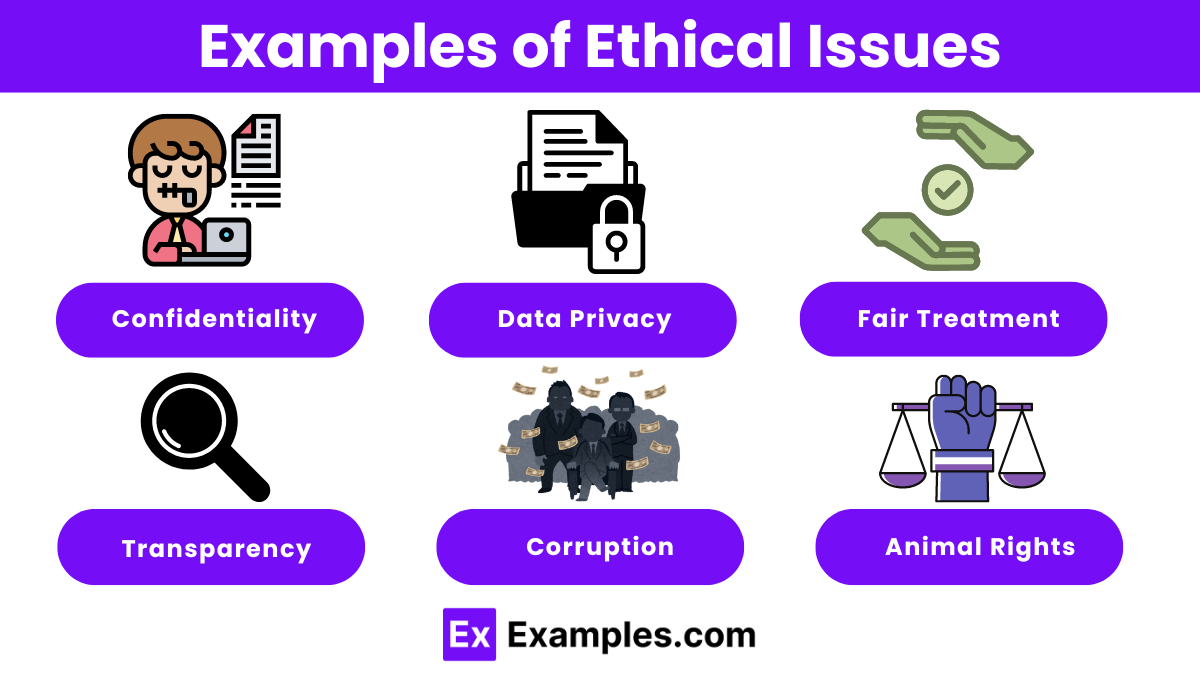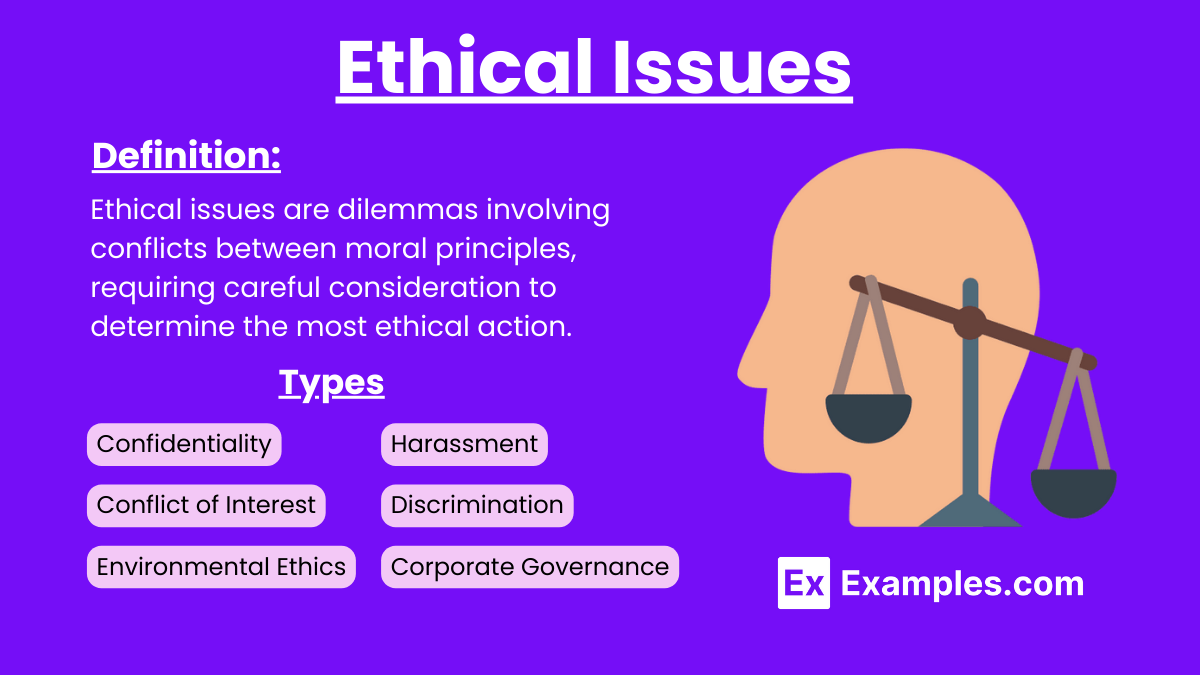50+ Ethical Issues Examples
Ethical issues are a complex and multifaceted area of study that explores the principles guiding human behavior and decision-making. These moral issues often arise in various contexts, including personal, professional, and societal domains. Ethical communication plays a crucial role in navigating these dilemmas, ensuring that interactions are honest, respectful, and transparent. Writing an essay on ethics involves examining different perspectives and frameworks to understand and resolve these challenges effectively.
What are Ethical Issues?
Ethical issues are dilemmas or situations that involve questions of right and wrong, requiring individuals to choose between conflicting moral principles. They often arise in various contexts, challenging people to make decisions based on ethical standards and values.
Examples of Ethical Issues

- Confidentiality: Respecting the privacy of personal information.
- Conflict of Interest: Managing personal interests that conflict with professional responsibilities.
- Informed Consent: Ensuring individuals understand and agree to the terms before participation.
- Whistleblowing: Reporting unethical behavior within an organization.
- Data Privacy: Protecting personal data from unauthorized access.
- Intellectual Property: Respecting the ownership rights of creators.
- Fair Treatment: Ensuring equal and just treatment of all individuals.
- Corporate Social Responsibility: Businesses addressing social and environmental concerns.
- Environmental Sustainability: Making decisions that protect the environment.
- Animal Rights: Treating animals ethically and humanely.
- Workplace Discrimination: Preventing unfair treatment based on race, gender, or other characteristics.
- Harassment: Addressing and preventing inappropriate behavior.
- Corruption: Combating bribery and unethical practices.
- Transparency: Being open and honest in communication.
- Cultural Sensitivity: Respecting diverse cultural backgrounds.
Examples of Ethical issues in Business
- Bribery and Corruption: Offering or accepting gifts, money, or favors to influence business decisions.
- False Advertising: Misleading consumers with incorrect or exaggerated claims about a product or service.
- Discrimination: Unfair treatment of employees or customers based on race, gender, age, religion, or other personal characteristics.
- Privacy Violations: Mishandling or failing to protect customer or employee personal information.
- Insider Trading: Using confidential company information for personal gain in the stock market.
- Exploitation of Labor: Unfair wages, unsafe working conditions, or unreasonable working hours, particularly in developing countries.
- Environmental Harm: Engaging in practices that damage the environment, such as pollution or resource depletion, without taking steps to mitigate the impact.
- Intellectual Property Theft: Using patented or copyrighted materials without permission or proper compensation.
- Financial Misconduct: Falsifying financial statements or engaging in accounting fraud to mislead stakeholders.
- Customer Data Misuse: Selling or using customer data without their consent for purposes other than those originally intended.
Ethical Issues Examples in Society
- Privacy Invasion: Unauthorized surveillance or data collection by governments or corporations.
- Income Inequality: Disparities in income and wealth distribution leading to social and economic inequities.
- Healthcare Access: Inequitable access to medical care and resources based on socioeconomic status.
- Discrimination: Unfair treatment of individuals based on race, gender, age, religion, or sexual orientation.
- Environmental Degradation: Practices contributing to pollution, climate change, and loss of biodiversity.
- Human Trafficking: Exploiting individuals through forced labor, prostitution, or other forms of modern slavery.
- Police Brutality: Excessive use of force by law enforcement officers, often targeting marginalized communities.
- Freedom of Speech: Balancing the right to free expression with the need to prevent hate speech and misinformation.
- Gun Control: Debates over the regulation of firearms to balance public safety with individual rights.
- Animal Rights: Ethical treatment of animals in agriculture, research, and entertainment industries.
Ethical issues in Healthcare
- Informed Consent: Ensuring patients fully understand and agree to the risks and benefits of medical procedures.
- Patient Privacy: Protecting personal health information from unauthorized access and breaches.
- End-of-Life Care: Navigating decisions regarding palliative care, life support, and euthanasia.
- Resource Allocation: Fair distribution of limited medical resources, such as organs for transplant or critical care beds.
- Access to Care: Addressing disparities in healthcare availability based on socioeconomic status, location, or insurance coverage.
- Medical Errors: Handling mistakes in treatment or diagnosis ethically, including disclosure and compensation.
- Patient Autonomy: Respecting patients’ rights to make their own healthcare decisions.
- Genetic Testing and Screening: Managing the ethical implications of genetic information, including privacy and potential discrimination.
- Experimental Treatments: Balancing the risks and benefits of unproven therapies, especially in clinical trials.
- Mental Health Care: Ensuring ethical treatment of patients with mental health issues, including consent and autonomy.
Ethical Issues in Case Study
- Confidentiality: Protecting the identities and personal information of the subjects involved in the case study.
- Informed Consent: Ensuring that all participants are fully aware of the purpose, procedures, and potential risks of the study and have agreed to participate voluntarily.
- Bias and Objectivity: Avoiding personal biases and ensuring that the case study is conducted and reported objectively.
- Misrepresentation: Accurately presenting data and findings without manipulating or distorting the information.
- Participant Harm: Ensuring that the case study does not cause physical, psychological, or emotional harm to the participants.
- Cultural Sensitivity: Respecting the cultural backgrounds and beliefs of the participants and avoiding cultural biases.
- Data Privacy: Safeguarding the data collected during the case study to prevent unauthorized access and breaches.
- Conflict of Interest: Disclosing any potential conflicts of interest that may influence the conduct or outcomes of the study.
- Use of Findings: Ensuring that the results of the case study are used ethically and do not harm the participants or any other stakeholders.
Examples of Ethical issues in Technology
- Data Privacy: Ensuring the protection of personal data from unauthorized access and breaches.
- Cybersecurity: Addressing the risks and ethical implications of hacking, data breaches, and cyberattacks.
- Artificial Intelligence Bias: Preventing and mitigating biases in AI algorithms that can lead to unfair treatment or discrimination.
- Surveillance: Balancing the need for security with individuals’ rights to privacy.
- Digital Divide: Addressing inequalities in access to technology and the internet.
- Intellectual Property: Protecting the rights of creators and inventors in the digital age.
- Fake News and Misinformation: Combating the spread of false information online.
- Social Media Ethics: Handling issues such as online harassment, hate speech, and the ethical responsibilities of social media platforms.
- Autonomous Vehicles: Ensuring the safety and ethical programming of self-driving cars.
- Genetic Engineering: Navigating the ethical implications of CRISPR and other genetic modification technologies.
Examples of Ethical Issues in Research
- Informed Consent: Ensuring participants fully understand the nature, purpose, risks, and benefits of the research before agreeing to take part.
- Confidentiality: Protecting the privacy of participants and ensuring their personal data is kept secure and not disclosed without consent.
- Plagiarism: Presenting another person’s work or ideas as one’s own without proper attribution.
- Fabrication and Falsification: Making up or altering data to present a false impression of the research findings.
- Conflict of Interest: Disclosing any financial or personal interests that could affect the research’s integrity or outcomes.
- Deception: Misleading participants about the true purpose of the research, which can undermine trust and integrity.
- Risk of Harm: Ensuring that research does not cause physical, psychological, or emotional harm to participants.
- Animal Welfare: Ensuring humane treatment and minimizing suffering of animals used in research.
- Misuse of Research Funds: Using research grants and funding for purposes other than those specified.
- Authorship Disputes: Fairly recognizing all contributors to the research and avoiding disputes over authorship.
How to Handle Ethical Issues in the Workplace
- Establish a Code of Ethics: Create and communicate a comprehensive code of ethics, ensuring all employees understand the guidelines.
- Provide Ethics Training: Conduct regular ethics training sessions using real-life scenarios to illustrate ethical decision-making.
- Encourage Open Communication: Implement anonymous reporting channels and maintain an open-door policy for discussing ethical concerns.
- Lead by Example: Leaders should model ethical behavior and hold all employees accountable to ethical standards.
- Implement an Ethics Committee: Form a committee to address ethical issues and provide a transparent resolution process.
- Regularly Review and Update Policies: Regularly update ethical policies based on continuous improvement and employee feedback.
- Monitor and Audit: Conduct regular audits to ensure compliance and use performance metrics to adjust ethical practices.
- Promote a Culture of Integrity: Foster a culture that values ethics and reward employees who demonstrate ethical behavior.
- Address Ethical Issues Promptly: Address issues quickly to prevent escalation and ensure fair, impartial investigations.
- Provide Support Resources: Offer ethics hotlines and guidance documents to support ethical decision-making.
Types of Ethical Issues
Confidentiality: Confidentiality issues occur when private information is disclosed without consent. This is common in professions like healthcare, law, and counseling.
Conflict of Interest: This arises when an individual’s personal interests could potentially interfere with their professional responsibilities.
Discrimination: Discrimination involves unfair treatment based on characteristics such as race, gender, age, or religion.
Harassment: Harassment includes unwanted and inappropriate actions directed towards someone, often creating a hostile work or social environment.
Environmental Ethics: These issues concern the impact of activities on the environment and the ethical responsibility to minimize harm.
Corporate Governance: Ethical issues in corporate governance relate to the proper management and oversight of organizations.
Fair Labor Practices: This involves the ethical treatment of workers, including fair wages, safe working conditions, and the right to organize.
How to Manage Ethical Issues
- Establish Clear Ethical Guidelines: Develop and implement a comprehensive code of ethics, clearly defining acceptable and unacceptable behaviors.
- Educate and Train: Conduct regular training sessions on ethical standards and practices to ensure all employees and stakeholders understand the ethical guidelines.
- Encourage Open Communication: Foster an environment where individuals feel safe to voice concerns and implement mechanisms for reporting unethical behavior anonymously.
- Lead by Example: Ensure leaders and managers demonstrate ethical behavior and hold everyone accountable, regardless of their position.
- Regularly Review and Update Policies: Continuously assess and improve ethical guidelines, adapting policies to new challenges and changes in the industry.
- Implement an Ethics Committee: Form a committee to oversee ethical practices and address issues, providing a clear process for resolving ethical dilemmas.
- Monitor and Audit: Regularly monitor and audit organizational practices for compliance, using findings to make necessary adjustments and improvements.
- Promote a Culture of Integrity: Integrate ethical values into the organization’s culture and reward ethical behavior and decision-making.
What is confidentiality in ethics?
Confidentiality in ethics means keeping private information secure and not sharing it without permission.
What constitutes a conflict of interest?
A conflict of interest occurs when personal interests could influence professional duties.
How is discrimination an ethical issue?
Discrimination is treating someone unfairly based on characteristics like race or gender.
Why are privacy issues important in ethics?
Privacy issues involve the unauthorized use or misuse of personal information.
What are environmental ethics?
Environmental ethics concern the impact of actions on the environment and minimizing harm.
How do consumer rights relate to ethics?
Consumer rights involve treating consumers fairly and honestly, avoiding deceptive practices.
How does fraud relate to ethical issues?
Fraud involves deception for personal or financial gain, violating ethical standards.
Why is academic research ethics important?
Academic research ethics ensure integrity, honesty, and respect in conducting and reporting research.
How does ethical decision-making work?
Ethical decision-making involves evaluating actions based on moral principles and their impact.
What are the consequences of ethical violations?
Ethical violations can lead to legal penalties, loss of trust, and damage to reputation.



